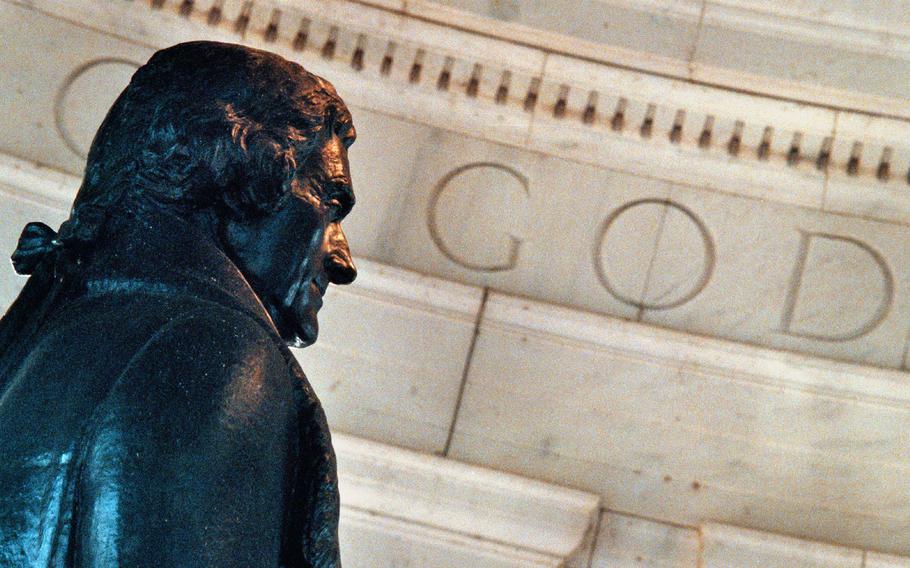
The Thomas Jefferson Memorial. (Sarah L. Voisin/The Washington Post)
Thanksgiving didn’t become an annual national holiday until the days of Abraham Lincoln, but at the time of the nation’s founding, religious feasts (and fasts) of thanksgiving were a regular thing. Both the Continental Congress and Gen. George Washington declared days of public thanksgiving during the Revolutionary War after big victories. And in 1779, Virginia’s wartime governor, Thomas Jefferson, signed a proclamation declaring Thursday, Dec. 9, “a day of publick and solemn thanksgiving and prayer to Almighty God.”
But decades later, when Jefferson was president, he had turned against thanksgiving proclamations — privately complaining about them before publicly condemning them toward the end of his term.
Why the about-face? Politics, of course.
A brief review: The rebelling British colonies first united under the Articles of Confederation, a framework intentionally designed to disperse power as broadly as possible to the new states. This was an utter failure — states didn’t even use the same coins! — and in 1787, the Constitutional Convention in Philadelphia came up with a new framework that bolstered federal power while still leaving a lot to the states.
Politicians, scholars, jurists and Americans in general have been fighting ever since about how powerful the federal government should or should not be. The first political parties to take up this fight were the Federalists, like John Adams, and the Democratic Republicans, like Jefferson. (Washington warned against the formation of these political parties, but he basically acted like a Federalist, even if he never called himself one.)
Things got bitter fast and erupted during the presidential election of 1800 (see track 42 of the “Hamilton” soundtrack). Smear campaigns abounded, with many accusing Jefferson, the eventual victor, of being an atheist. (The rumor that Jefferson had fathered children with an enslaved woman — now proved true — doesn’t appear in the historical record until 1802.)
Jefferson wasn’t an atheist, but he still held theological ideas considered radical for his day. Though he believed in a benevolent creator, he questioned biblical miracles, divine intervention and the Christian trinity. He crafted his own version of the New Testament, studied other religious texts like the Quran, and in a famous 1802 letter to persecuted Baptists in Danbury, Conn., promised the group his protection.
Mostly, he thought a person’s religion was a private matter, which fit neatly with the Democratic Republican dismissal of presidential proclamations of thanksgiving as a stuffy, morally dubious holdover from the British monarchy, according to historian James H. Hutson.
After all, these thanksgiving proclamations, which had continued under presidents Washington and Adams, weren’t calls for turkey and stuffing, family travel or for everyone to go around in a circle and say what they were thankful for. They were orders, or at least strong suggestions, for people to set aside a day for praying and fasting, and for clergy to deliver sermons on a national theme, one often infused with politics.
For example, in 1795, Washington declared a national day of thanksgiving after putting down the Whiskey Rebellion. The Pennsylvania farmers forced into submission, and their Democratic Republican supporters, may not have appreciated the president’s implication that God was on his side. On another day of thanksgiving proclaimed by Adams, Democratic Republicans held public demonstrations instead.
In his letter to the Danbury Baptists, Jefferson interpreted the First Amendment in the Bill of Rights as “building a wall of separation between church and State.” In a contemporaneous letter, Jefferson told a friend he hoped to use his response to the Baptists, which he knew would be reprinted in newspapers, as a chance to explain his “political tenets” on “why I do not proclaim fastings and thanksgivings, as my predecessors did.” In fact, in the 1990s, the FBI recovered an inked-out portion of a draft of the Danbury letter, showing that Jefferson had originally planned to lampoon these thanksgivings as “performances of devotion” more associated with King George III.
Jefferson, at his friend’s recommendation, ultimately deleted this inflammatory section of the letter. But he got another chance to explain his opposition to days of thanksgiving in 1808, when a Presbyterian minister suggested he proclaim one.
Jefferson responded: “I consider the government of the U.S. as interdicted by the constitution from intermed[d]ling with religious institutions, their doctrines, discipline, or exercises. This results not only from the provision that no law shall be made respecting the establishment, or free exercise, of religion, but from that also which reserves to the states the powers not delegated to the U.S.”
Then, he added just a hint of an insult toward Washington and Adams. “I am aware that the practice of my predecessors may be quoted, but I have ever believed that the example of State executives led to the assumption of that authority by the general government, without due examination, which would have discovered that what might be a right in a state government, was a violation of that right when assumed by another.”
His successor, James Madison, would revive the thanksgiving proclamation tradition in 1815, but for the eight years Jefferson was in office, there was no thanksgiving.